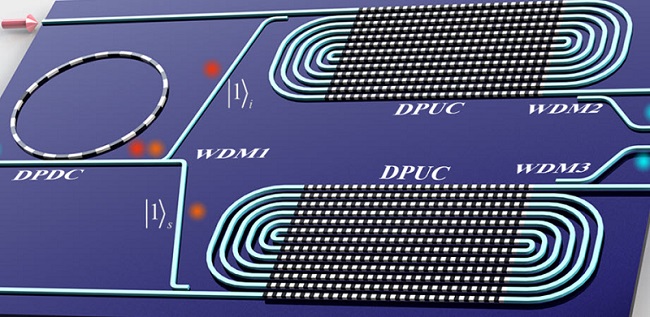NANJING, China, Feb. 20, 2023 — Among all quantum systems, photons are known for their weak interaction, which allows long coherence time to be achieved even at room temperature, making them suitable for transmitting qubits between distant locations. However, the weak interaction of photons restricts the generation of quantum states known as multiphotonic qubit states, or “N-photon states.” Generating N-photon states remains a fundamental challenge in the field of quantum optics.
In response, researchers from Nanjing University have proposed a scheme that could generate multiphotonic qubit states deterministically, so that photon number doubling happens with 100% efficiency, with an unlimited numbers of photons. The scheme is experimentally feasible, taking account of practical material capability by using a lithium-niobate-on-insulator (LNOI) platform, which provides an ultrastrong X(2) nonlinear interaction.

On-chip scheme for deterministic N-photon state generation in LNOI circuit. Courtesy of Liu, Shang et al., doi: 10.1117/1.APN.2.1.016003.
The key component in the advancement is the photon-number doubling unit (PDU), which can double photon numbers while keeping the spectrum unchanged. In the PDU, the most challenging part is the deterministic conversion from single-photon to bi-photon. It’s been proposed and theoretically studied before, but only with an ideal X(2) or X(3) material assumption.
Based on practical material parameters, the researchers proposed what they said is the first experimentally feasible scheme for the PDU process. The team showed that the PDU is universal for generation of N-qubit states for different quantum technology applications, proposing as examples on-chip designs for an N-photon Fock state, cluster state, and GHz state.
The scheme involves deterministic parametric down-conversion (DPDC) in a high-Q LNOI micro-ring resonator. Combining the ultrahigh nonlinearity of the LNOI platform and the cavity-enhancement effect of the resonator DPDC can be achieved with 107 Q-factor micro-ring, which is within the current limits of fabrication and experimentation.
Besides the DPDC, for scalability, a deterministic parametric upconversion (DPUC) is necessary in the PDU for converting the photon frequency back to pump frequency. The researchers showed that this can be achieved with mW-level on-chip power in LNOI circuitry.
The researchers believe that the work provides significant guidance for actual realization of large-photon-number states in the future.
Senior author Zhenda Xie, professor at Nanjing University’s School of Electronic Science and Engineering, said, “Such deterministic single-photon interaction based on LNOI may be used not only for photon generation, but also for photon manipulation to realize quantum gates, quantum storage, and so on, to push forward the development of quantum computation, quantum communication, and overall quantum information technology.”
The research was published in Advanced Photonics Nexus (www.doi.org/10.1117/1.APN.2.1.016003).